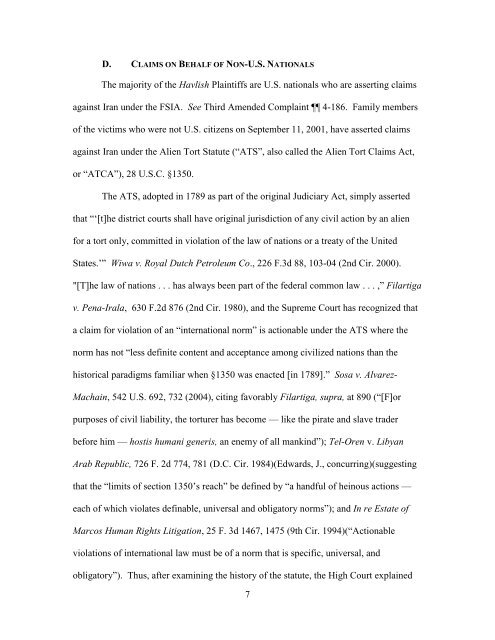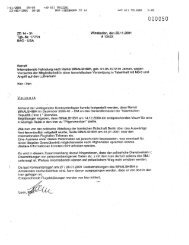You also want an ePaper? Increase the reach of your titles
YUMPU automatically turns print PDFs into web optimized ePapers that Google loves.
D. CLAIMS ON BEHALF OF NON-U.S. NATIONALSThe majority of the Havlish Plaintiffs are U.S. nationals who are asserting claimsagainst <strong>Iran</strong> under the FSIA. See Third Amended Complaint 4-186. Family membersof the victims who were not U.S. citizens on September 11, 2001, have asserted claimsagainst <strong>Iran</strong> under the Alien Tort Statute (―ATS‖, also called the Alien Tort Claims Act,or ―ATCA‖), 28 U.S.C. §1350.The ATS, adopted in 1789 as part of the original Judiciary Act, simply assertedthat ―‗[t]he district courts shall have original jurisdiction of any civil action by an alienfor a tort only, committed in violation of the law of nations or a treaty of the UnitedStates.‘‖ Wiwa v. Royal Dutch Petroleum Co., 226 F.3d 88, 103-04 (2nd Cir. 2000)."[T]he law of nations . . . has always been part of the federal common law . . . ,‖ Filartigav. Pena-Irala, 630 F.2d 876 (2nd Cir. 1980), and the Supreme Court has recognized thata claim for violation of an ―international norm‖ is actionable under the ATS where thenorm has not ―less definite content and acceptance among civilized nations than thehistorical paradigms familiar when §1350 was enacted [in 1789].‖ Sosa v. Alvarez-Machain, 542 U.S. 692, 732 (2004), citing favorably Filartiga, supra, at 890 (―[F]orpurposes of civil liability, the torturer has become — like the pirate and slave traderbefore him — hostis humani generis, an enemy of all mankind‖); Tel-Oren v. LibyanArab Republic, 726 F. 2d 774, 781 (D.C. Cir. 1984)(Edwards, J., concurring)(suggestingthat the ―limits of section 1350‘s reach‖ be defined by ―a handful of heinous actions —each of which violates definable, universal and obligatory norms‖); and In re Estate ofMarcos Human Rights Litigation, 25 F. 3d 1467, 1475 (9th Cir. 1994)(―Actionableviolations of international law must be of a norm that is specific, universal, andobligatory‖). Thus, after examining the history of the statute, the High Court explained7









